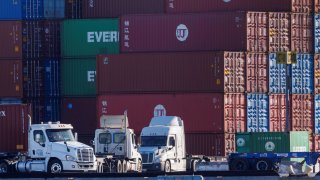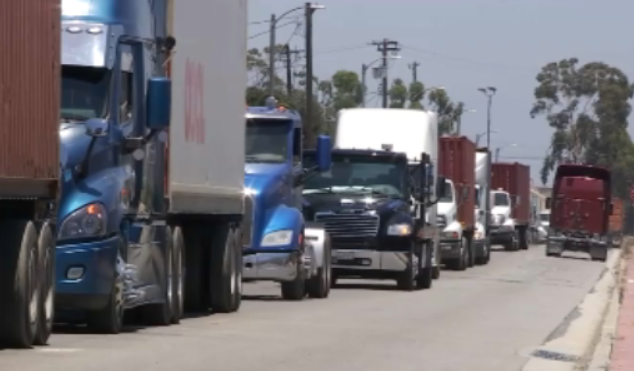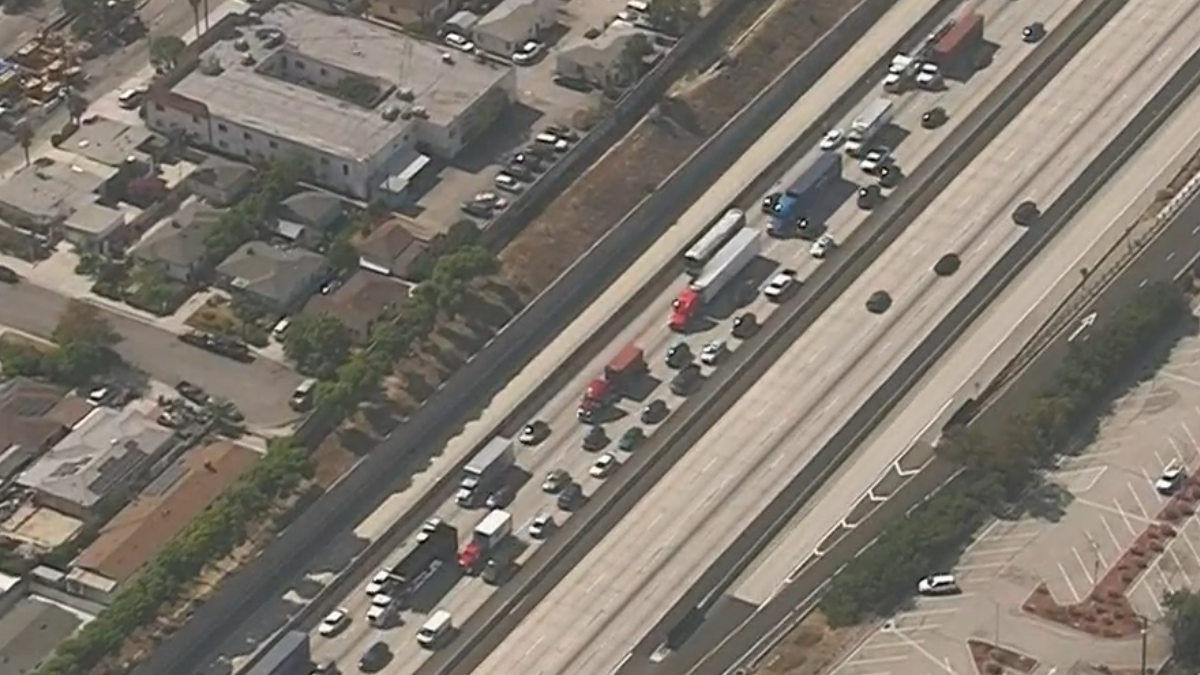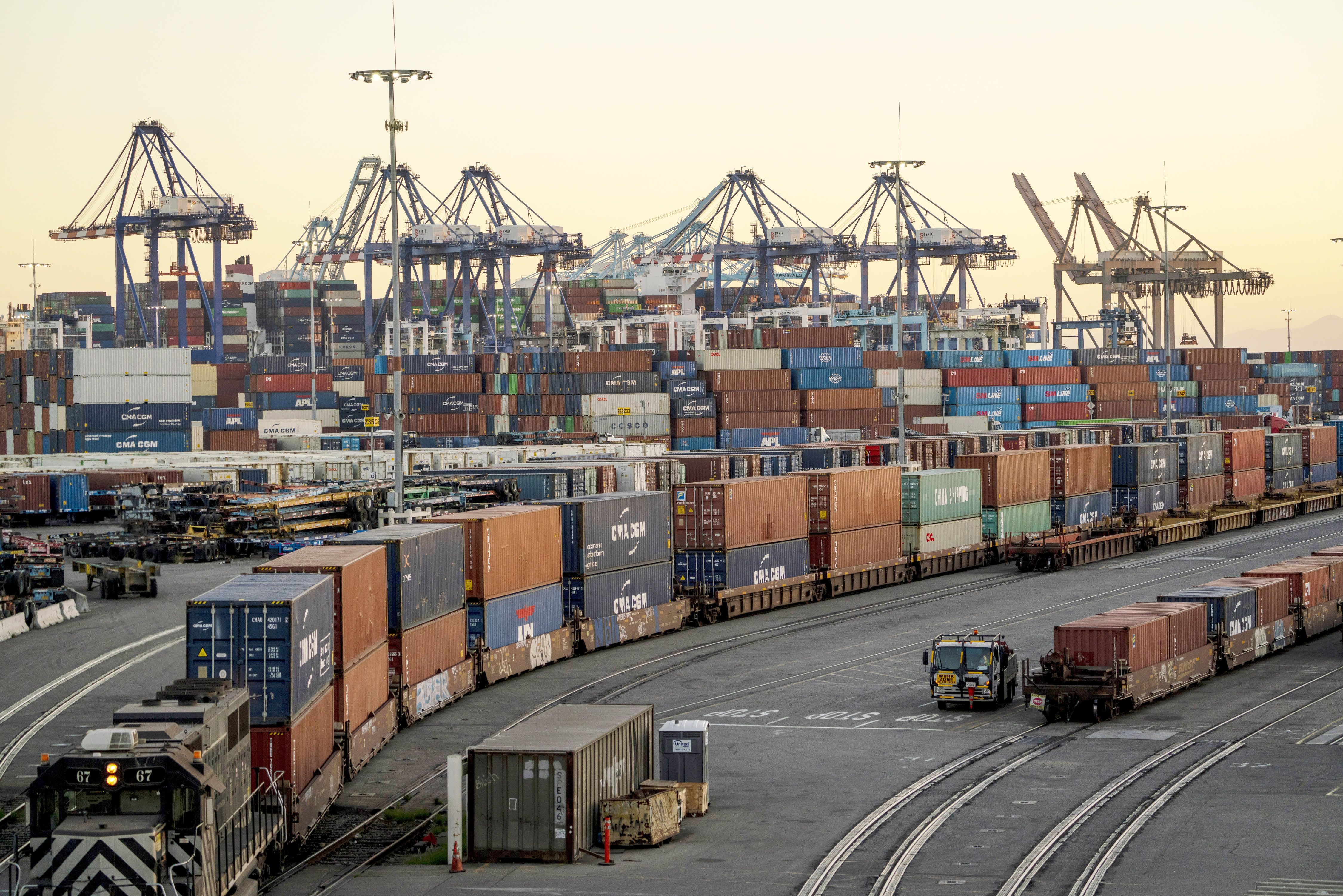
Trucks arrive to pick up containers at the Port of Los Angeles, November 22, 2021.
Independent truckers snarled traffic on freeways in the Los Angeles, Long Beach and San Pedro areas this week to protest AB5, a bill passed and signed into law years before that they argue is going to kill trucker jobs amid skyrocketing inflation and the supply chain issue.
While officials said the protest did not affect operations at the Los Angeles-Long Beach port complex, the protest slowed traffic on the Vincent Thomas Bridge, 110 and 710 freeways. Hundreds also protested in Oakland.
Stream Los Angeles News for free, 24/7, wherever you are.
Representatives also signed an open letter to Gov. Gavin Newsom Friday, urging him to stop AB5, and prevent it from crippling the already chaotic supply chain.
Get top local stories in Southern California delivered to you every morning with NBC LA's News Headlines newsletter.
So what exactly is Assembly Bill 5?
AB 5 was passed in 2019, authored by Asm. Lorena Gonzalez (D-San Diego) and approved by Gov. Gavin Newsom. It says that independent contractors – potentially tens of thousands of truckers operating in California – have to pass an “ABC” test in order to be classified as such.
Here are the rules, according to the California Trucking Association:
- A. The person is free from the control and direction of the hiring entity, both in contract and in fact.
- B. The person performs work that is outside the usual course of the hiring entity’s business.
- C. The person is customarily engaged in an independently established trade, occupation, or business of the same nature as the work performed.
The California Trucking Association argues that it’s tough to meet those standards, and the law will take 70,000 independent truckers off the roads, meaning it would further exacerbate the supply chain issue and backlog at the ports.
The Port of Los Angeles is the United States’ busiest port, and according to the World Bank report, the ports of LA and Long Beach are the world’s least efficient.
And hold onto your seats – it gets even more complicated.
AB5 is also part of a bigger regulatory battle. You may recall “gig worker” law hotly debated by Uber, Lyft, their workers and unions. The law, that officially took effect in 2020, changed the rules around who is staff vs. an independent contractor, and independent contractors are not entitled to the same benefits as staff workers. For example, independent contractors are not entitled to paid family leave, workers’ comp, overtime, or unemployment insurance.
Gig workers then were required to be reclassified as employees, and were entitled to get benefits. That is until Prop 22 came around – and this is when Uber and Doordash entered the picture – and it successfully passed in the November 2020 state election. Then Prop 22 was overturned in February 2022, meaning Uber drivers could not be classified as independent contractors.
Lawsuit Hoping to Stop AB 5
The California Trucking Association challenged AB5 in court with CTA v. Bonta, but the Supreme Court declined to review the lawsuit June 30. It was kicked down to lower courts.
Truckers have operated as independent contractors for decades in California. Because AB5 changes how they would be classified, truckers are worried they will have to take on added costs, like buying their own insurance. Independent truckers who own or lease their own trucks and don’t work for larger companies worry they will be forced to spend tens of thousands of dollars on insurance premiums.
The International Brotherhood of Teamsters labor union, however has argued that AB5 is actually aiming to protect truckers, and that the status quo in California has been depriving truckers for years because trucking companies classify them as independent contractors.
Open Letter to California Governor
Rep. Michelle Steel (CA-48), joined by multiple other representatives, penned an open letter to Gov. Newsom, arguing that because it makes it difficult for truckers to do their jobs, many will leave California.
“This creates a legal mess made by the State of California. Not only could this be devastating to California, but it may be catastrophic for the United States and will only drive prices higher. On top of record-high inflation, the last thing American families need are higher costs,” the letter reads.
The letter also argues this will have a ripple effect, affecting farmworkers, and construction.
”Amidst record drought, their products are sitting at backlogged ports waiting to be shipped. Instead of being on grocery store shelves, fresh food is spoiling because of California’s failed policies,” the letter reads.
The representatives who signed the letter include: Reps. Young Kim, Reps. Kevin McCarthy (CA-23), Darrell Issa (CA-50), Ken Calvert (CA-42), Tom McClintock (CA-4), Mike Garcia (CA-25), Connie Conway (CA-22), David Valadao (CA-21), Doug LaMalfa (CA-01), and Jay Obernolte (CA-08).




